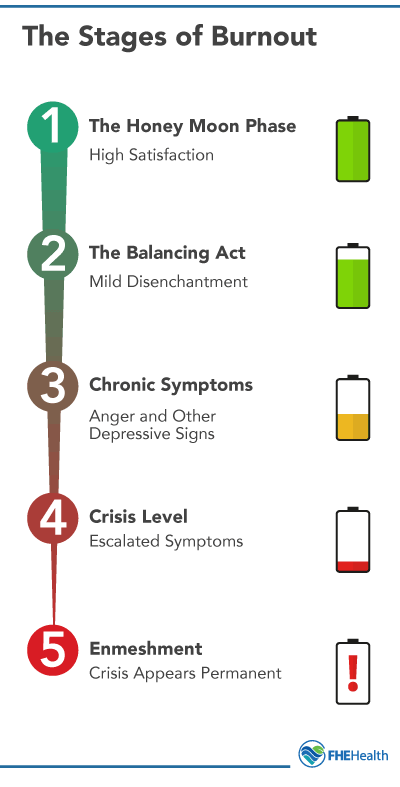
This article has been reviewed for accuracy by our peer review team which includes clinicians and medical professionals. Learn more about our peer review process.
“Burnout” is an increasingly familiar phenomenon lately. The term has come to describe the experience of record numbers of Americans, whose work lives became unsustainable or overwhelming during the COVID pandemic.
Burnout is largely “an occupational phenomenon,” according to the World Health Organization’s (WHO’s) definition, which calls it a “syndrome,” characterized by: “feelings of energy depletion or exhaustion; increased mental distance from one’s job, or feelings of negativism or cynicism related to one’s job; and reduced professional efficacy.”
If left unaddressed, burnout can lead to potentially serious health and other problems. For insights into these issues, as well as tips for how to recognize and address burnout in healthy ways, we turned to Dr. Beau A. Nelson, who is the Chief Clinical Officer at FHE Health.
What Is Burnout, and What Are Its Signs?
 Dr. Nelson cited the WHO’s definition of burnout as a helpful starting place in a discussion of burnout and its signs. He described burnout as “going on autopilot, feeling overwhelmed and that things seem pointless, and prolonged physical and emotional stress.” Notably, burnout “can mimic depressive symptoms.” It can also seem like a “general malaise or being stuck and going through the motions.”
Dr. Nelson cited the WHO’s definition of burnout as a helpful starting place in a discussion of burnout and its signs. He described burnout as “going on autopilot, feeling overwhelmed and that things seem pointless, and prolonged physical and emotional stress.” Notably, burnout “can mimic depressive symptoms.” It can also seem like a “general malaise or being stuck and going through the motions.”
“If you’re feeling exhausted, overwhelmed, or don’t have the same energy or drive,” that, too, can indicate burnout.
In addition to these signs, there can be identifiable stages of burnout, according to Dr. Nelson. He cited research at Winona State University that provides a “five-stage” framework for understanding burnout:
- Stage 1 is the “honeymoon phase” in a job, marked by high satisfaction and engagement.
- Stage 2 is the “balancing act” period where mild disenchantment sets in and may be accompanied by job dissatisfaction, work inefficiency, fatigue, or “escapist activities” like drinking, smoking, watching TV, etc.
- Stage 3 consists of “chronic symptoms” that may include anger or other depressive symptoms, chronic exhaustion, and/or physical sickness.
- Stage 4 is when these symptoms have escalated to a “crisis” level, at which point “the symptoms become critical.”
- Stage 5 is “enmeshment,” when symptoms of burnout have become so ingrained in one’s life that they look more like a permanent “physical or emotional problem” than burnout.
Common Coping Habits for Burnout?
Even before COVID, burnout was commonplace. Research by Deloitte has found that 77 percent of U.S. workers have reportedly burned out at least once in their careers.
Given these high rates of burnout, how do people generally cope with it? They may “take it out on others, shut down, or self-medicate with food, alcohol, or drugs,” Dr. Nelson said. “They may find they have a lot more time to veg and spend lots of time sitting and trying to relax but never seem to get anywhere with it. Also— disconnecting with people and things they used to enjoy. They may become negative and irritable and can tend to blame situations.”
How to Support Someone Who Is Showing These Signs?
Here Dr. Nelson made several recommendations for how to support a loved one who may be showing signs of burnout:
- “If you see someone who seems burned-out, talk to them in a non-judgmental way and get their input; let them share what’s going on for them.
- Engage them in healthy activities like exercise and include them in things that would be fun or joyful for them.
- Look at what’s going on and develop a plan to be supportive of good, healthy habits.”
How to Get Help if You Have Burnout?
There may be times when professional help is the right next step for a case of burnout, yet many people may not know where to go for help or how to access it. Dr. Nelson offered this advice:
Sometimes burnout is a sign of something deeper that’s going on. Having a counselor can be very helpful. These regular check-ins for ongoing support are about evaluating where you are and what’s going on for you and starting to look beyond the problem to make changes and move out of it.
Dr. Nelson noted that often “people get burned out with their jobs and don’t see how much of their identity is taken up by their job … They’re dealing with financial stress, fears of the pandemic and health issues.” With professional help, they can begin to develop “those healthy boundaries and balance, which are so important.”
Another important differentiation, according to Dr. Nelson: “acute stress” versus “chronic stress.”
“Work is going to be stressful and have its times, but acute stressful situations are very different from chronic stress situations. Often, we can handle acute situations where we know that the week ahead will be stressful, but when a person can never get their head above the water, they are going to become demotivated and lethargic and feel helpless.”
One of the benefits of seeing a counselor, Dr. Nelson added, is “to not feel helpless”—and, that there are things one can do to improve their situation.
Some Helpful Self-Care Tips for Chronic Stress and Burnout?
Self-care is “individualized,” Dr. Nelson emphasized. In other words, the key is finding what works well for you in combating chronic stress and burnout. “Are you eating right and using your support system?,” Dr. Nelson asked. He noted that some people benefit from “spiritual disciplines like yoga and mindfulness” and that “finding outlets is really important”:
…some people need time to lay on the grass and stare at the sky. Other people need an activity for a sense of purpose or inclusion … If you look at the things that excite, please, and comfort you, then if you’re in a dark place that’s a good place to begin. You also can ask yourself, “What can I let go of?”
“We’ve got the least amount of vacation time than any other industrialized country,” Dr. Nelson added. “The two-week vacation in one year is not a great motivator, so we need to find good things to do for ourselves and find balance and take time for ourselves.”
Along these lines, Dr. Nelson recommended taking vacation time as needed to support your mental well-being. Many people do not use their time; it can be a helpful tool.
How to Know if Professional Help Is Necessary?
“If you’ve checked off some of the things that you can do on your self-care list and don’t find yourself getting better, then going to a knowledgeable professional for counseling and possibly medication may be helpful,” Dr. Nelson said. “Assessing where you are is important because chronic burnout could morph into a mood disorder or depression when a person has begun to feel so helpless.”
Dr. Nelson gave this rationale for professional help: “We hire a personal trainer for our bodies and a professional beautician for our hair. Why not hire a professional counselor for what’s going on in our head? This can be very freeing and can lead you to conclusions that can help you take a new view of yourself and a different approach.”
Quiz: Coping Mechanisms
Dangers of Ignoring the Signs of Burnout?
These, in a nutshell, are “suicide, divorce, and drug use,” Dr. Nelson said. “We’re seeing a lot of alcohol abuse, domestic violence, depression, and anxiety, and this past year and a half is a great example of how we’re hitting our limits and experiencing burnout.”
He offered another word of caution about why it is important to recognize and address signs of burnout:
When we’re in an emotional state, we don’t make clear healthy decisions, so if you’re really stuck in a bad cycle, you’ve got to be careful, because you might make decisions based on how you’re feeling that don’t help you.
In the end, one of the most important lessons of attending to burnout is “learning how to live our life even when we have stresses and pressures, but not letting these take over our life.”






